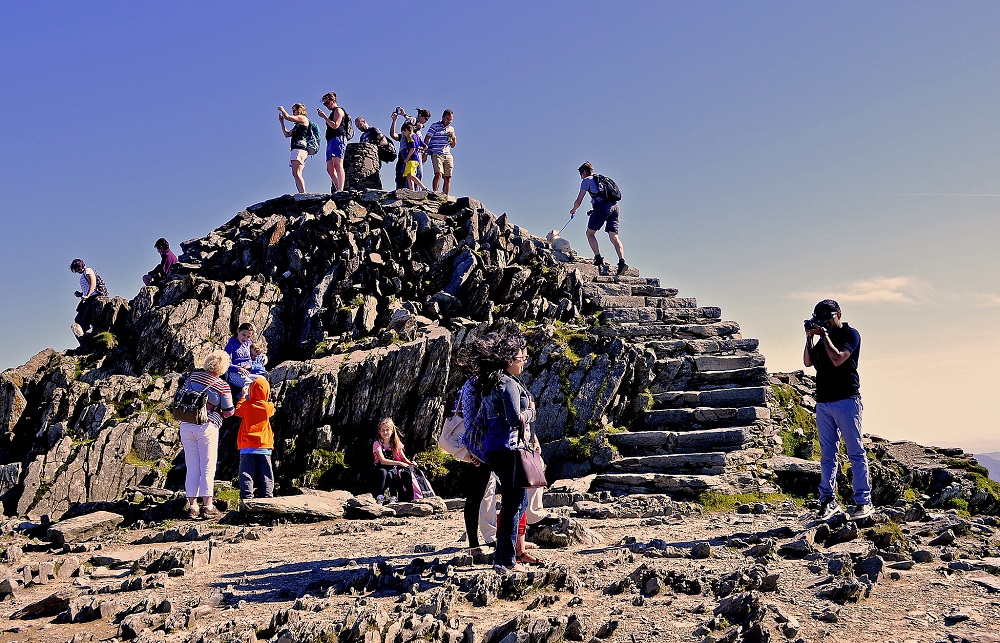Telegraph backs ‘Wyddfa’ campaign claiming Anglicisation ‘driving a dagger through heart’ of Welsh language

The campaign to call Snowdon only by its Welsh name, Yr Wyddfa, has received backing from an unexpected source – the Telegraph newspaper.
The Conservative-backing paper said that the “Anglicising of Welsh places and landscapes is becoming endemic” and “driving a dagger through the heart of the language”.
In an editorial by News Editor Gareth Davies, the newspaper also adds that “natives have long been priced out of idyllic Welsh villages by mainly English people snapping up second homes”.
The article adds that you “shouldn’t change a name for the sake of it” but that Snowdon is “a needless title that has seemingly caught on to appease people unable to pronounce Yr Wyddfa”.
“Not to get too snowflakey about it, but names do matter. Especially when it comes to language and the use of a language that so many hold dear to their hearts. And it’s not exclusive to Wales.
“Take Mount Everest. The highest mountain in the world isn’t known by its Tibetan name Chomolungma, meaning goddess mother of the world.
“Instead, it has been stripped of its national identity to please the masses, named after Colonel Sir George Everest who was born in – checks notes… – Powys.
“Other peaks in Wales have escaped a St George-inspired rebrand. Cader Idris is still charmingly Cader Idris – Idris’s Chair, Idris being a giant. Pen-Y-Fan, South Wales’s tallest peak, simply translates to Top-Of-The-Hill.”
The article finishes: “The motion in North Wales should be passed. The mountain is Welsh, the mountain range is ours, and Yr Wyddfa should be screamed from the rooftops.”
‘Howlers’
The editorial a motion by Cllr John Pughe Roberts that Wales’ highest mountain, at 3,560ft, should only be referred to by its Welsh name, which was rejected by Snowdonia National Park Authority.
Its Chair, Wyn Ellis Jones said its members had decided there was “no need to consider the motion” that day, because a Welsh Place Names Task and Finish Group has already been appointed to look into the issue.
A petition has now been launched for a national park authority to ditch the name Snowdon.
Despite its backing for the Yr Wyddfa name, the Telegraph does however criticise the tendency to give new developments badly thought through Welsh language names with no meaning.
“Some will try to appease the Welsh language with a bilingual condescending pat on the head, like Parc Plymouth or Cae St Fagans. But arguably, when the decision is made to go all-Welsh, that is where the worst crimes of all come from,” the article states.
It refers to a new-build estate in Barry, which is “littered with a haul of howlers”.
“These street names really are something to behold: Cenin Pedr (Daffodil), Afal Sur (Sour Apple), Coed Criafol (Rowan’s Trees), Esgid Mair (Mary’s Shoe), Carn-Yr -Ebol (The Foal’s Pile)… the road-naming equivalent of yelling “DOS LARGE BEERS, POR FAVOR!” at the Spanish waiter thinking: ‘That’ll do, I gave it a good go.'”
Support our Nation today
For the price of a cup of coffee a month you can help us create an independent, not-for-profit, national news service for the people of Wales, by the people of Wales.







Offa’s Dyke (Clawdd Offa) nesaf
The first recorded use of “Snawdune” (a Saxon name) was in 1095, whereas the first for Yr Wyddfa was in 1284. Yr Wyddfa means “the burial place”, and a barrow seems to have existed there until mid-Victorian times, by when it had been robbed to such an extent to provide building materials for the small village of refreshment huts that it was no longer extant. Rhita Gawr, the giant in the early Welsh story Kulhwch ac Olwen, was reputedly buried there.
The two names seem to have existed side by side in the medieval period. For example, Llywelyn the Great styled himself ‘prince of Wales and lord of Snowdon’ (dominus Snaudonie) in the early 13th century. He was probably referring to Eryri rather than Yr Wyddfa, and he was consciously looking for a novel title (and in Latin at that), but it’s interesting that he used the English name when he could just as easily have gone for dominus Eryriae or whatever. Snowdon is a name with some serious Welsh history behind it.
The spoken name predates the written name.
I hope we can also get rid of anglicised name changes like ‘Rhos-on-Sea’ (Cymraeg = Llandrillo-yn-Rhos) and ‘Bangor-on-Dee’ (Cymraeg = Bangor-is-y-Coed) too.